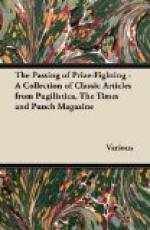“Alas!” said my wife, “the secret chamber is where we keep the jam.”
She smiled subtly at me and then winningly at the inspector as she turned towards him.
“Step this way, please,” she continued.
I caught the idea at once and, blessing the quick wit of woman, followed in the victim’s wake, ready to close the secret panel behind him and leave him to a lingering death.
My wife slid open the trap, turning with a triumphant smile as she did so, and I saw at once that the death of anyone shut up inside would be a lot more lingering than I had imagined, for the place seemed full of jam. I was surprised.
“Can I be going to eat all that?” I thought; and life seemed suddenly a very beautiful thing.
The inspector ran a hungry eye over it all, and if he had tried to clamber inside for a closer inspection I should not have given him the quick push I had planned. I should have held him back by his coat. My own way of testing the amount of jam which my wife had made was not for the likes of him.
“About a hundred-and-fifty pounds,” he said at last.
“Just a little over,” nodded my wife.
“I tell you,” I whispered, “this chap knows everything.” Then aloud, “I say, Sir, if you wouldn’t mind putting me on to something for the Cotsall Selling Plate. Simply,” I added hastily, “in the national interest, of course. Keeping up the breed of horses.”
The inspector changed the subject again. “You were allocated one hundredweight of sugar, I believe, Ma’am,” he said.
“Oh, yes,” replied my wife. “But you see some of our jam is still sticking to the trees. Perhaps this gentleman would like to see the orchard, Wenceslaus,” she added, turning to me.
(Of course, you know, my Christian name isn’t really Wenceslaus, but we authors enjoy so little privacy nowadays that I must really be allowed to leave it at that.)
So I took the inspector off to see the orchard, pausing on the way at the strawberry bed.
“This,” I explained, “was to have made up quite fifty pounds of our allocation, but I’m afraid the crop failed this year. So that must account for any little discrepancy in the weight of fruit.” I was very firm about this.
“Strawberries have done well enough elsewhere,” said Nemesis suspiciously. “I’m surprised that yours should have failed.”
“When I say ‘failed,’” I explained, “I mean ’failed to get as far as the preserving pan.’ I always retain an option on eating the crop fresh.”
The inspector frowned and was going to make a note of this, so I tried to distract his attention.
“Do you know,” I said, “a short time ago people persisted in mistaking me for a brother of the Duke of Cotsall?”
“Why?” he asked—rather rudely.
“Because of the strawberry mark on my upper lip. Ah, I think this is the orchard. There was a wealth of bloom here when I put in my application.”




